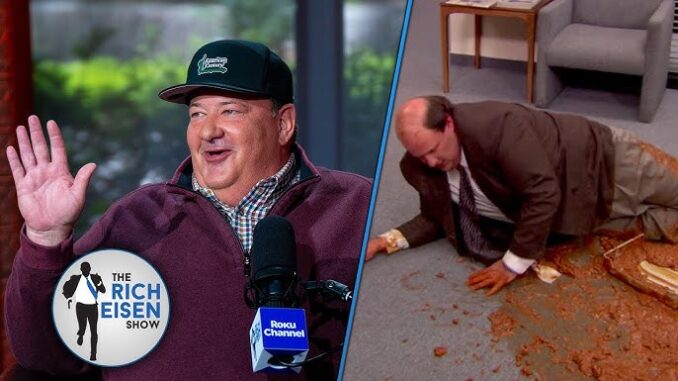
The image is indelible, burned into the collective comedic consciousness: a man, slightly overweight, with the earnest, almost childlike face of Kevin Malone, tottering through an office, a gargantuan pot of chili clutched precariously. His mission, a simple act of culinary kindness for his colleagues, quickly devolves into an epic, slow-motion catastrophe. The pot slips, and in a gut-wrenching moment of cinematic brilliance, a brown, viscous tide engulfs the office floor, along with Kevin’s soul. It's a scene so perfectly executed, so profoundly tragicomic, that it transcends mere physical comedy to become a Rorschach test for the soul, revealing our own anxieties about effort, failure, and public humiliation. And, as Brian Baumgartner, the man behind Kevin, has since revealed, the "secrets" of this iconic spill only deepen our appreciation for its meticulous craft and enduring power.
On the surface, the chili scene is a masterclass in physical comedy and character-driven pathos. We see the anticipation in Kevin’s eyes, the pride in his laborious achievement, a solitary man’s grand gesture. Then, the almost balletic stumble, the desperate, flailing attempts to recapture the falling pot, and finally, the slow-motion collapse, not just of the chili, but of Kevin himself, splayed amidst the brown sea. There are no words, only a primal, guttural sigh of despair, a testament to Baumgartner’s ability to convey profound heartbreak without a single line of dialogue. The humor is born from this unadulterated pain, the sheer, unbridled failure of a simple, well-intentioned act. It is, in essence, an everyman's nightmare, played out for our simultaneous empathy and laughter.
Brian Baumgartner's revelations, however, pull back the curtain, transforming a moment of seemingly spontaneous chaos into a testament to deliberate artistry. One "secret" lies in the sheer amount of chili. It wasn't a symbolic splash; it was a deluge. Baumgartner described tubs upon tubs of the stuff, crafted by the prop department to be the perfect consistency – not too thick to clump, not too thin to disappear, but just right for maximum spread and visual impact. This wasn't some theatrical trick with a small amount of liquid; this was an honest, messy, immersive commitment. This practical detail underlines the scene's authenticity; the sheer volume of the spill amplifies the tragedy, making Kevin's defeat feel truly overwhelming. The commitment to such a simple, tangible element elevates the scene from funny to legendary.
Beyond the volume, Baumgartner also shed light on the meticulous choreography of the fall. While it appears an accident, Kevin's slip was carefully engineered. The floor was greased, the path precise. This wasn't about the actor genuinely losing his footing and hoping for the best; it was about executing a precise movement designed to convey utter helplessness. Baumgartner had to hit specific marks, ensure the pot tumbled in a specific way, and land just so, all while maintaining Kevin’s internal state of mounting panic and then abject devastation. This insight transforms our understanding of the scene from spontaneous genius to a carefully rehearsed, technically brilliant piece of physical theatre. It highlights the unsung dedication of the actor and the crew to make a controlled environment look utterly out of control.
Perhaps the most poignant secret Baumgartner shared, however, was about Kevin's internal world. For Kevin, this wasn't just a pot of chili; it was his magnum opus, his grand contribution, his one moment to shine. Baumgartner spoke of the deliberate choice to portray not just clumsiness, but deep, genuine effort in Kevin’s preparation and then equally deep, genuine heartbreak in its ruin. The slow, painstaking scooping motion, the careful carrying, the silent lament – it all stemmed from an actor's profound understanding of his character. Kevin’s despair wasn’t an act; it was a reflection of his pure, simple heart shattered by a mundane tragedy. This dedication to psychological realism within a comedic framework is what truly elevates The Office, and this scene in particular, beyond mere slapstick.
Ultimately, the chili scene is more than just a funny moment; it's a microcosm of The Office's enduring appeal. It blends cringe-worthy humor with genuine human emotion, showcases brilliant physical comedy, and hinges on an actor’s nuanced performance. Brian Baumgartner’s revelations don't demystify the magic; they illuminate the intricate web of practical decisions, technical precision, and heartfelt character interpretation that coalesced to create television history. The next time Kevin Malone’s chili spills across your screen, remember the tubs of real chili, the greased floor, and the actor who, in that singular moment of utter despair, poured his own dedication into illustrating the simple, devastating tragedy of a man and his ruined masterpiece. It's a secret that only sweetens the bitter taste of cinematic failure.